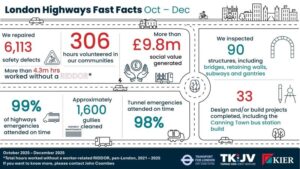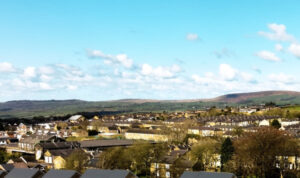A new technique using recycled car tyres to resurface roads has been used in Lancashire for the first time.
Lancashire County Council has been trialling an innovative asphalt mix using granulated rubber created by Tarmac and has recently resurfaced Abingdon Road, Padiham.
Rubber modified asphalts incorporate recycled tyres combined with warm mix asphalt technology and are prepared at a lower temperature than traditional asphalts.
The addition of the ground tyre rubber means that less fossil fuel derived bitumen is used, as well as less energy due to the lower temperatures used. It delivers the same performance and surface characteristics as traditional materials but it is more environmentally friendly.
Phil Durnell, Director of Highways and Transport at Lancashire County Council said: “I was really pleased to come onsite and see the material being used for the first time on a Lancashire highway.
“I was quite surprised how much rubber is in the mix, it’s around 1 car tyre per tonne so on that basis we put end of life 150 tyres in the road in just one day.
“The lower layers of the carriageway here have also been recycled using a cold foam mix process. This is essentially a circular process where the material is removed from the site to be directly recycled into the new material, with the recycled content typically being 95%.
“Overall, by using recycled materials in the lower layers and rubber modified asphalt surfacing, we have lowered the carbon footprint of this scheme by over 30%.
“We are really keen to reduce our carbon footprint in maintaining Lancashire’s roads and we are hoping to use this technique as part of our Highways Decarbonisation Strategy. This year in our carriageway capital programmes, we are predicted to save 332 tonnes of CO2 through using lower carbon processes.”
Ian Carr, Senior Technical Manager, Tarmac North & Scotland said: “After plane out of the existing road surface and the laying of the recycled binder course, 160 tonnes of ULTIPAVE R asphalt was supplied by Tarmac and laid by Lancashire County Council, with support available from Tarmac’s Technical and Commercial team. Using this innovative approach helped the council to deliver reductions in carbon dioxide emissions and recycle rubber from 150 waste tyres.
“Our solution contains high quality aggregates for lasting texture and skid resistance. This would ensure a safe, durable road surface. Warm mix asphalts also offer proven gains in productivity, requiring less time to reach trafficking temperatures and allowing more work to be completed at one time.”
























